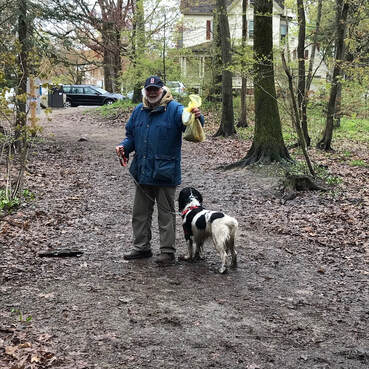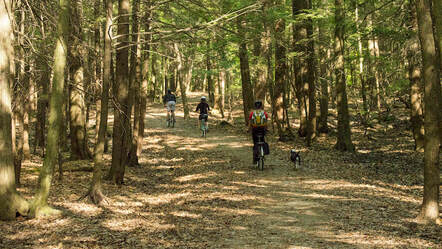Reasons to Revise the New Leash Law
The ecological study along with documentation of dog behavioral incidents were presented at the Parks Commission meetings in the spring and summer of 2019 to support the new “dogs on leash” proposal. In addition, the Parks Department discussed their belief that dogs off leash were in contradiction to the original1946 Deed (for refutation of this argument, please read about Mayor Baxter's intentions here). The actual report from the ecological study, however, did not result in such a drastic proposal, Instead, it stated the following:
“Recreation use. Use trail cameras or other monitoring methods for fixed periods of time to quantify and describe recreation use and evaluate the potential impact of unleashed dogs on wildlife.”
FoMBW offered the following comments to the proposal:
“Recreation use. Use trail cameras or other monitoring methods for fixed periods of time to quantify and describe recreation use and evaluate the potential impact of unleashed dogs on wildlife.”
FoMBW offered the following comments to the proposal:
- Birds: The City’s $6,200 MBW management report claims that bird habitat is being negatively impacted by off-leash dogs. These statements, however, were not supported by any observations or scientific evidence. Instead, the report states that 81% of the Woods acreage itself is unsuitable for bird nesting/foraging. The supporting Audubon literature for" Managing Bird Habitats in Forest Settings" does not include any discussion of the impact of dogs. Furthermore, there are no historical reports of bird habitat degradation, even given the neglected state BW was in from the 1950’s through the 1980’s.
We continue to wonder how many ground-nesting birds reside in or migrate to Baxter woods? There is a diverse wildlife population, including many species that directly prey on birds and bird eggs (e.g., raccoons, foxes, and squirrels). If anything, the presence of dogs may be a deterrent to these known bird predators.
One of the alternatives suggested for off-leash dogs, the trails behind Evergreen Cemetery, is a widely known bird-watching site; if a declining bird population is the major rationale for leashing dogs, why would off-leash dogs be redirected to Evergreen? If dogs disturb ground-nesting and ground-feeding birds, why disrupt a known habitat only to put resources into establishing a new, less hospitable, habitat? Birds will not only have to survive the raccoon and fox populations but will soon be confronted with the noise and light pollution associated with the development of the field, as the first condominiums to be developed are located directly adjacent to the newly proposed bird sanctuary.
We believe that the proposed Bird Habitat Restoration Area (BRHA) violates the 1946 deed, as it would preclude pedestrian access within MBW. In addition, the BHRA is to be located along Motherhouse fence-line area, an area which will be heavily impacted by noise and light pollution, known factors in the declining bird population (see here for just one example of a growing literature on this topic).**
**see our "What About the Birds" response, one section of a 15-page document submitting to the City - Enforcement: With respect to waste and voice control, signage is posted, yet nothing has been enforced. Additional patrolling and enforcing fines, possibly with the cameras suggested in the report, could quickly change behavior.
- Dog Behavioral Incidents: As shown in the Park Department's records, over a period of seven years, there were relatively few documented cases concerning dog aggression incidents (again, monitoring can determine whether or not these types of incidents occur with greater frequency in off-leash areas as compared to on-leash areas and/or in MBW as compared to other parts of the City). Specifically, the records show 16 complaints from 12 people, four of whom are directly connected to the Parks Commission (e.g., they did not come from the public). Although the Parks Department has referred to verbal complaints, these are anecdotal as they were not documented or tracked.
- Alternative Off-Leash Areas: Baxter Woods is primarily a destination for local residents. It is not a “dog park” (Quarry or Valley Street, designated dog parks, are not viable options for many due to numerous negative experiences, travel distance given time restrictions, accessibility etc.). In addition, these alternatives have inadequate parking to accommodate current users of MBW; this is true of both Canco Road and Evergreen cemetery trails, with access being an additional issue at Evergreen. Many of these alternative sites are not accessible to the elderly or disabled walkers due to roots and other obstacles.
- Dog waste: Lack of picking up has become a problem in Baxter woods and elsewhere as the population and use increases. The PPH had an article about Hinckley Park (3/22/19) discussing this. Their Park ranger had planted 300 flags to encourage awareness and promote pickup prior to a predicted rain storm. We propose a similar strategy, along with monthly pick-up days, to heighten both awareness and compliance with the rules. (Again, the dog owner population changes over time, as we believe that continued education is the best strategy.)
- Process: The Parks Department did not hold any public meetings or conduct outreach to local stakeholder groups, such as the Deering Center Neighborhood Association or the Responsible Dog Owners of Baxter Woods Facebook group, prior to presenting the proposals. Furthermore, they did not allow an organized group to present at the Parks Commission meetings. We suggest that the proposal should be put on hold in order to allow the FoMBW group more time to organize and address any concerns.
- CONTINUE to read "Potential Social and Health Consequences of Changing the Leash Law"


